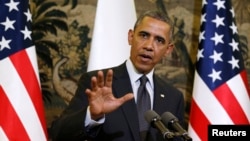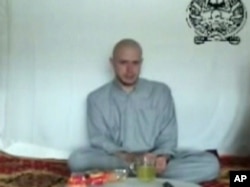President Barack Obama on Tuesday defended the deal to get U.S. Army Sgt. Bowe Bergdahl out of Taliban captivity, saying questions that have emerged about the circumstances of the soldier's capture did not negate the need to bring him home.
As Bergdahl emerges from five years of captivity, former comrades have accused him of walking away from his unit, prompting a manhunt that they say cost the lives of at least six fellow soldiers.
“We don't leave soldiers behind. ... Whatever those circumstances may turn out to be, we still get an American soldier back if he's held in captivity. Period. Full stop,” Obama said at a news conference in Poland.
The United States is committed to freeing its prisoners of war regardless of how they were captured, Obama said.
"That's what every mom and dad who sends a son or daughter [to war] should expect from the United States," he added.
U.S. Gen. Martin Dempsey, chairman of the Joint Chiefs of Staff, said on Tuesday that the Army “will not look away from misconduct if it occurred” although other military officials have indicated Bergdahl would not face any charges after his five-year ordeal.
The New York Times cited a former military official as saying Bergdahl slipped away from his base near the Afghan border with Pakistan, leaving a note saying he had become disillusioned with the army and the war and was going to start a new life.
Dempsey stressed that Bergdahl, who was taken as a private and promoted while in captivity, is innocent until proven guilty, and that the military would continue to care for him and his family.
"The questions about this particular soldier's conduct are separate from our effort to recover ANY U.S. service member in enemy captivity," Dempsey wrote in a statement.
"This was likely the last, best opportunity to free him. As for the circumstances of his capture, when he is able to provide them, we'll learn the facts,” Dempsey added.
The process used by the military to help recovered personnel return to normal life
involves medical care, psychological support, debriefings and family support.
It is carried out in three phases:
- Phase 1: Initial Recovery - The returnee is given medical triage, psychological support and a tactical debriefing
- Phase 2: Decompression Location - The returnee is moved to a regional hospital for at least 72 hours for more medical exams and debriefings
- Phase 3: United States Base - The returnee is reunited with family and receives more medical care and final debriefings
Source: U.S. Army
Bergdahl undergoing tests
Bergdahl, who was flown to a military hospital in Germany over the weekend to undergo physical and mental assessments, was not being interrogated and had not yet seen his family, Obama said.
The president, who has drawn criticism for not notifying Congress ahead of the transfer of five Taliban prisoners from Guantanamo Bay to Qatar in return for Bergdahl's release, said his administration had told lawmakers earlier about a possible swap.
“We have consulted with Congress for quite some time about the possibility that we might need to execute a prisoner exchange in order to recover Sgt. Bergdahl. We saw an opportunity. We were concerned about Sgt. Bergdahl's health,” Obama said.
“We seized that opportunity. And the process was truncated because we wanted to make sure that we did not miss that window.”
Obama acknowledged that the freed Taliban fighters could potentially act against U.S. security but said the United States could go after them if they did.
"The Qataris will be keeping eyes on them. We will be keeping eyes on them. Is there the possibility of some of them trying to return to activities that are detrimental to us? Absolutely,” Obama said.
“I wouldn't be doing it if I thought that it was contrary to American national security and we have confidence that we will be in a position to go after them if in fact they are engaging in activities that threaten our defenses.”
Some information for this report provided by Reuters, AFP and AP.
As Bergdahl emerges from five years of captivity, former comrades have accused him of walking away from his unit, prompting a manhunt that they say cost the lives of at least six fellow soldiers.
“We don't leave soldiers behind. ... Whatever those circumstances may turn out to be, we still get an American soldier back if he's held in captivity. Period. Full stop,” Obama said at a news conference in Poland.
The United States is committed to freeing its prisoners of war regardless of how they were captured, Obama said.
"That's what every mom and dad who sends a son or daughter [to war] should expect from the United States," he added.
U.S. Gen. Martin Dempsey, chairman of the Joint Chiefs of Staff, said on Tuesday that the Army “will not look away from misconduct if it occurred” although other military officials have indicated Bergdahl would not face any charges after his five-year ordeal.
The New York Times cited a former military official as saying Bergdahl slipped away from his base near the Afghan border with Pakistan, leaving a note saying he had become disillusioned with the army and the war and was going to start a new life.
Dempsey stressed that Bergdahl, who was taken as a private and promoted while in captivity, is innocent until proven guilty, and that the military would continue to care for him and his family.
"The questions about this particular soldier's conduct are separate from our effort to recover ANY U.S. service member in enemy captivity," Dempsey wrote in a statement.
"This was likely the last, best opportunity to free him. As for the circumstances of his capture, when he is able to provide them, we'll learn the facts,” Dempsey added.
Reintegration of recovered military personnel
Reintegration of recovered military personnelThe process used by the military to help recovered personnel return to normal life
involves medical care, psychological support, debriefings and family support.
It is carried out in three phases:
- Phase 1: Initial Recovery - The returnee is given medical triage, psychological support and a tactical debriefing
- Phase 2: Decompression Location - The returnee is moved to a regional hospital for at least 72 hours for more medical exams and debriefings
- Phase 3: United States Base - The returnee is reunited with family and receives more medical care and final debriefings
Source: U.S. Army
Bergdahl, who was flown to a military hospital in Germany over the weekend to undergo physical and mental assessments, was not being interrogated and had not yet seen his family, Obama said.
The president, who has drawn criticism for not notifying Congress ahead of the transfer of five Taliban prisoners from Guantanamo Bay to Qatar in return for Bergdahl's release, said his administration had told lawmakers earlier about a possible swap.
“We have consulted with Congress for quite some time about the possibility that we might need to execute a prisoner exchange in order to recover Sgt. Bergdahl. We saw an opportunity. We were concerned about Sgt. Bergdahl's health,” Obama said.
“We seized that opportunity. And the process was truncated because we wanted to make sure that we did not miss that window.”
Obama acknowledged that the freed Taliban fighters could potentially act against U.S. security but said the United States could go after them if they did.
"The Qataris will be keeping eyes on them. We will be keeping eyes on them. Is there the possibility of some of them trying to return to activities that are detrimental to us? Absolutely,” Obama said.
“I wouldn't be doing it if I thought that it was contrary to American national security and we have confidence that we will be in a position to go after them if in fact they are engaging in activities that threaten our defenses.”
Some information for this report provided by Reuters, AFP and AP.






